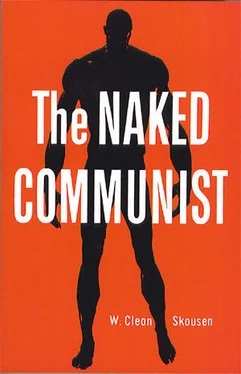For the son of a bourgeois businessman, young Engels had a surprisingly limited education; at least it did not include any extensive university training. But what he lacked in formal training he supplied through hard work and native talent. He spent considerable time in England and learned both English and French with such facility that he succeeded in selling articles to liberal magazines of both languages.
Biographers have emphasized that while the hearty and attractive Engels differed in personal traits from the brooding, suspicious Marx, nevertheless, the two of them followed an identical course of intellectual development. Engels, like Marx, quarreled bitterly with his father, took to reading Strauss’s Life of Jesus , fell in with the same radical left-wing Hegelians who had attracted Marx, became an agnostic and a cynic, lost confidence in the free-enterprise economy of the Industrial Revolution and decided the only real hope for the world was Communism.
Engels had been an admirer of Marx long before he had a chance to meet him. It was in August, 1844, that he traveled to Paris for the specific purpose of visiting Marx. The magnetic attraction between the two men was instantaneous. After ten days both men felt it was their destiny to work together. It was during this same ten days that Marx converted Engels from a Utopian Communist to an outright revolutionist. He convinced Engels that there was no real hope for humanity in the idealism of Robert Owen or Saint-Simon but that conditions called for a militant revolution to overthrow existing society. Engels agreed and proceeded back to Germany.
Six months later Marx was expelled from France, along with other revolutionary spirits, and took up residence in Brussels, Belgium. Here Marx and Engels wrote The Holy Family , a book designed to rally around them those Communists who were willing to completely disavow any connection with the so-called “peaceful reforms” of philanthropy, Utopianism or Christian morality. The red flag of revolution was up and Marx and Engels considered themselves the royal color-guard.
The strange relationship which rapidly developed between Marx and Engels can be understood only when it is realized that Engels considered it a privilege to be associated with such a genius as Marx. Among other things, he counted it an honor to be allowed to assume responsibility for Marx’s financial support. Shortly after Marx was expelled from France, Engels sent him all the ready cash in his possession and promised him more: “Please take it as a matter of course that it will be the greatest pleasure in the world to place at your disposal the fee I hope shortly to receive for my English literary venture. I can get along without any money just now, for my governor (father) will have to keep me in funds. We cannot allow the dogs to enjoy having involved you in pecuniary embarrassment by their infamous behavior.”
This new partnership between Marx and Engels gave them both the courage to immediately launch an International Communist League based on the need for a violent revolution. They planned to use the workers in Germany and France as the backbone for their new political machine but this proved bitterly disappointing. After spending several months among the French workers Engels castigated them because they “prefer the most preposterous day-dreaming, peaceful plans for inaugurating universal happiness.” He told Marx that the tinder for a revolution in France was nonexistent. Having thus failed in their plan to build their own revolutionary organization, Marx and Engels decided to take over one that was already in existence. In August, 1847, they succeeded in gaining control of the “Workers’ Educational Society” in Brussels. This immediately gave them prestige among reform organizations in Europe. It also gave them the first opportunity to extend their influence in England. At this point Marx and Engels would have been surprised to know that England rather than the Continent would become the headquarters for their revolutionary work.
During November, 1847, word came from London that the “Federation of the Just” (later known as the Communist League) wanted Marx and Engels to participate in their second congress as representatives of the Communist organizations in Brussels. Marx and Engels not only attended the congress but practically took it over. By staying up most of the night laying their plans and by using shrewd strategy at each of the meetings, they succeeded in getting the congress to adopt all of their basic views. Marx and Engels were then commissioned to write a declaration of principles or a “Manifesto to the World.” They returned to Brussels and immediately set to work with Marx pouring into the text his passionate plea for a revolution. When they were through they had announced to mankind that the new program of International Communism stood for: 1. the overthrow of capitalism, 2. the abolition of private property, 3. the elimination of the family as a social unit, 4. the abolition of all classes, 5. the overthrow of all governments, and 6. the establishment of a communist order with communal ownership of property in a classless, stateless society. To accomplish this, the Communist Manifesto was crystal clear as to the course to be taken:
“In short, the Communists everywhere support every revolutionary movement against existing social conditions. Let the ruling classes tremble at a Communist revolution. The proletarians have nothing to lose but their chains. They have a world to win. Working men of all countries, unite!”
The red glare of revolution came much sooner than either Marx or Engels had anticipated. In February, 1848, while the ink on the Communist Manifesto was still drying, the revolutionary spirit of the French proletariat united with the resentment of the bourgeoisie against Louis Philippe and a violent uprising ensued which drove the Emperor from the country. Immediately afterwards a provisional government was set up which included members of the Communist League, who promptly summoned Marx to Paris. Marx was flushed with excitement when he arrived at the French capitol armed with full authority from the Communist League headquarters to set up the international headquarters in Paris and to engineer the revolutions in other countries from there.
Marx learned that the intoxicating success of the uprising in France had induced the radical element in the provisional government to send “legions” into surrounding countries. Their purpose was to launch an uprising in each country and build the revolution into one magnificent conflagration. Although this was precisely what Marx had been advocating for several years, he suddenly sensed that such a campaign at the present moment might backfire and cause them to lose the support of the masses in those countries where legions were sent. Nevertheless, the plan was adopted and the first legions were marched off to Germany. Marx soon followed and began publishing a revolutionary periodical in his native tongue called the Rheinische Zeitung.
The revolutionary leaders soon discovered that Marx was a propaganda liability. This became painfully evident when he was sent with other members of the Communist League to organize the workers in the Rhine Valley. Marx, when asked to address the German Democratic Congress, badly bungled this golden opportunity. Carl Schurz says: “I was eager to hear the words of wisdom that would, I supposed, fall from the lips of so celebrated a man. I was greatly disappointed. What Marx said was unquestionably weighty, logical and clear. But never have I seen any one whose manner was more insufferably arrogant. He would not give me a moment’s consideration to any opinion that differed from his own. He treated with open contempt everyone who contradicted him…. Those whose feelings he had wounded by his offensive manner were inclined to vote in favor of everything which ran counter to his wishes… far from winning new adherents, he repelled many who might have been inclined to support him.” {5} 5 Ruhle, Otto, Karl Marx , pp. 157-158.
Читать дальше











